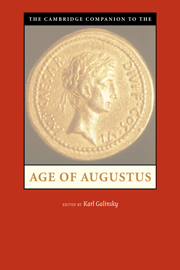Book contents
- Frontmatter
- Introduction
- Part I Political History
- 1 Augustus and the Power of Tradition
- 2 Augustus and the Making of the Principate
- Part II Intellectual and Social Developments
- Part III The Emperor's Impact
- Part IV Art and the City
- Part V Augustan Literature
- Part VI Epilogue as Prologue
- Select Bibliography and Works Cited
- Index
2 - Augustus and the Making of the Principate
from Part I - Political History
Published online by Cambridge University Press: 28 March 2007
- Frontmatter
- Introduction
- Part I Political History
- 1 Augustus and the Power of Tradition
- 2 Augustus and the Making of the Principate
- Part II Intellectual and Social Developments
- Part III The Emperor's Impact
- Part IV Art and the City
- Part V Augustan Literature
- Part VI Epilogue as Prologue
- Select Bibliography and Works Cited
- Index
Summary
Tacitus elected to begin his Annals with the death of Augustus. The free state was already dead - long since. “How many were left who had even seen the res publica?” (Ann. 1.3). Augustus' own longevity had enabled him to outlast almost all whose memories might stretch back to the Roman Republic. Nearly half a century had elapsed since the battle of Actium, sixty-three years since Caesar had crossed the Rubicon. Tacitus sums it up with typically concentrated force at the beginning of the Annals: “Augustus subjected all to his power - under the name of princeps” (Ann. 1.1). The contrast between word and fact, a Tacitean trademark, appears here in the very opening lines. Tacitus makes the same point elsewhere: “Augustus gave us the institutions under which we gain use of peace - and a princeps” (Ann. 3.28). The cynical attitude affected the view of the great eighteenth-century historian Edward Gibbon, who wrote “Augustus was sensible that mankind is governed by names. Nor was he deceived in his expectation that the senate and people would submit to slavery, provided they were respectfully assured that they still enjoyed their ancient freedom.” It did not happen in a day or a year. Augustus, says Tacitus, grew ever greater in small steps, gradually usurping for himself the functions of senate, magistrates, and laws (Ann. 1.2). Such was the Augustan principate, in Tacitus' jaundiced view.
- Type
- Chapter
- Information
- The Cambridge Companion to the Age of Augustus , pp. 33 - 52Publisher: Cambridge University PressPrint publication year: 2005
- 15
- Cited by

